

Liberal Judaism is a constituent of the World Union for Progressive Judaism
www.liberaljudaism.org
www.pathtoprogressivejudaism.org.uk



Liberal Judaism is a constituent of the World Union for Progressive Judaism
www.liberaljudaism.org
www.pathtoprogressivejudaism.org.uk
ON Sunday 18 May 2025 the member communities of Liberal Judaism and The Movement for Reform Judaism will vote on whether to unite into one Progressive Judaism for the UK at two parallel EGMs.
If both votes are positive, this date will mark the culmination of 250 years of change and progress – dating back to the Haskalah (Jewish Enlightenment) of the mid-1770s – and result in a defining moment in the history of British Jewry. It will also herald the start of a new future with a new movement that will represent one third of synagogue affiliated Jews; and we believe the majority of those yet to affiliate. It will give us a louder voice, a greater presence and, crucially, the opportunity to further grow our communities.
Rabbi Rebecca Birk is the representative of the Conference of Liberal Rabbis and Cantors on the Progressive Judaism Advisory Board, which has overseen this process. Her passion for forming one Progressive Judaism stems from her experiences studying in America. She writes: “In the USA, I had the mindopening experience of Progressive Judaism being the largest and most confident of all Jewish denominations.
“This is why I know that the co-creation of one Progressive Judaism for the UK will amplify our voice, increase our numbers and broaden what it means to be Jewish and engaged in modern life.”
Many readers will remember Rabbi Mark Goldsmith as a young Liberal minister in Finchley and Woodford. Today, he is the Senior Rabbi of Edgware and Hendon Reform Synagogue.
Rabbi Mark is steeped in both Liberal and Reform tradition, with family roots going back 200 years. He says that unlike the previous merger attempts of 1942 and 1983, we are in the right place in 2025 to make a long-held dream a reality.
He writes: “Both movements now have an established route to equilineality, enabling children of one Jewish parent, irrespective of gender, to have recognised Jewish status. Both are fully egalitarian and built by people of all sexualities and genders. Both are fully able to integrate and build the Jewish lives of mixed faith couples and families
“In regard to practice, Reform Judaism has become more flexible in its interpretation and Liberal Judaism more enthusiastic in its response to tradition. Above all, we celebrate the diversity of our synagogues and communities.
“That is why I believe it is now time to be one agudah (brotherhood and sisterhood) of Progressive Judaism.”
There is also huge support among lay leaders and congregants. A member for 103 years, Ruth Shire may be the longestserving Liberal Jew. She tells us: “I am feeling positive about the idea of a bigger group which can produce more important ideas and make them a reality.”
At the other end of the age spectrum, becoming one larger body will bring more opportunities – and funding – for our youth, student and young adult work. While LJY-Netzer and RSY-Netzer will remain distinct, they are already collaborating to offer enhanced experiences to young Progressive Jews – including a summer Israel experience and a new gap year programme.
Summing up the history that can be made, Liberal Judaism Chair Karen Newman said: “We believe that now is the moment for Progressive Judaism to thrive and flourish – providing a space that combines the best of Jewish tradition with modern values and lifestyles.”
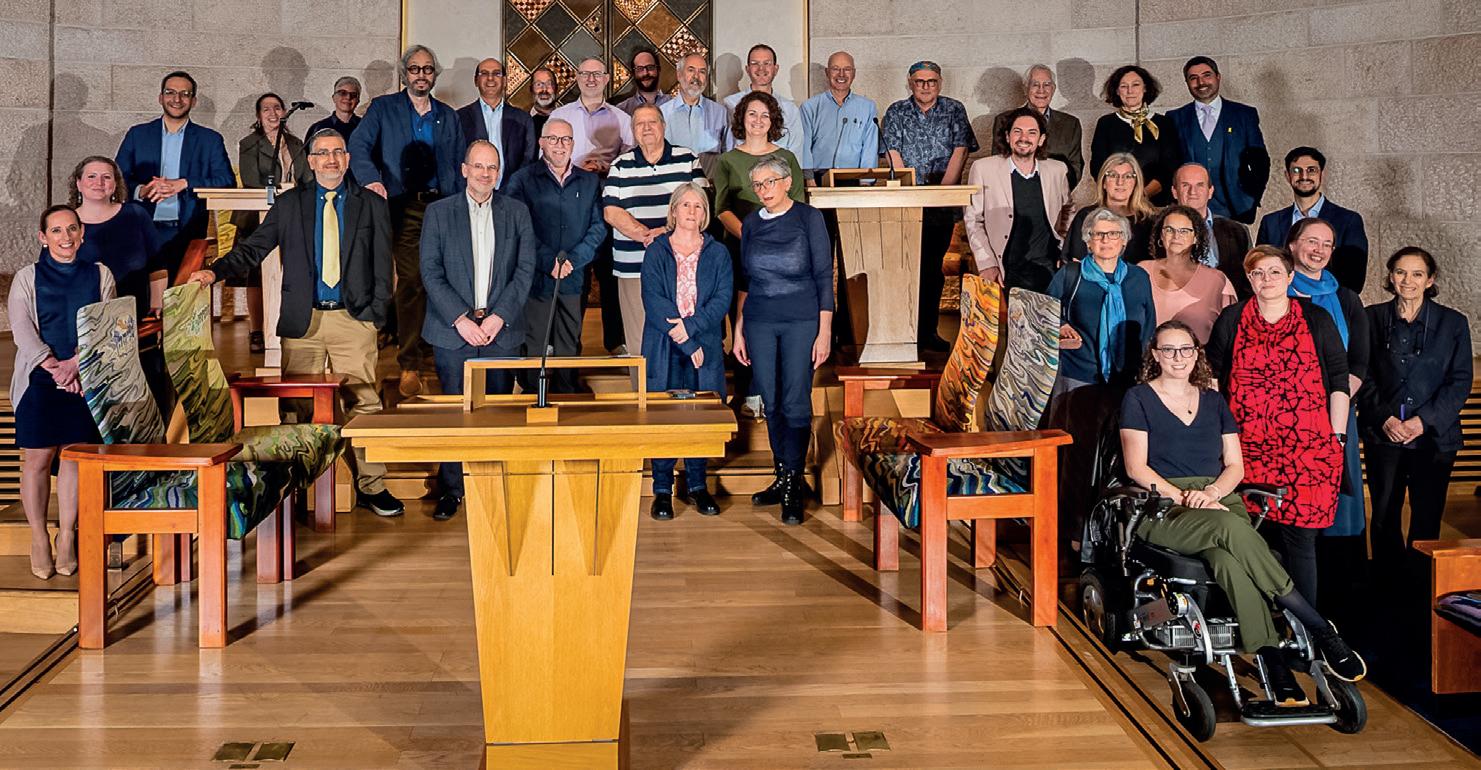
TO help prepare communities for the upcoming votes – that if positive will see the unification of Liberal and Reform Judaism – the leadership of every congregation was sent an information pack in January, which was also reproduced in part in lj today. A further set of materials was then sent in April following feedback and consultation. Here we share the key FAQs from that second release. To access everything sent out, please visit www.pathtoprogressivejudaism.org.uk/ information-pack
How will my community influence the work of the new movement?
At the heart of the proposed arrangements for the Movement for Progressive Judaism is a new meeting space – the Forum. In the Forum, every member community will have equal opportunity to be a voice in guiding the strategic direction of the movement. The Forum’s success will depend upon the commitment of members, clergy and other stakeholders to take their place in conversations about Progressive Judaism in this country.
Why have you chosen the weighted voting system outlined in the packs?
Any voting system is a compromise and many were modelled. The Implementation Committees believe that the current proposal reflects core values of fairness, balance and simplicity. It is carefully calibrated to ensure that, for a vote to be carried, it must have support from a range of communities. This avoids any one group or region dominating the rest and creates a built-in need for a consensual approach. A review will take place after three years to check it is working as intended.
Does the governance structure protect a diversity of communities and voices?
Yes. One of the most precious features of Progressive Judaism in this country is its diversity. The organising principle of the new Progressive Judaism is that, like the existing movements, it will be a membership organisation made up of autonomous communities with their own leadership. This is why the Forum will be so important – to bring together our different voices, needs and priorities in respectful conversation, striving for agreement where we can and celebrating diversity where we cannot.
What will be the role of the Progressive clergy in the new movement?
Clergy have a unique place within a religious movement. They are spiritual guides, moral leaders, pastoral supports, drivers of thought leadership and public voices. They are also often employed by member communities and sometimes members of communities themselves. It is therefore important for all stakeholders that clergy have a clearly defined and embedded place within the structures of movement leadership. They will play an important role in shaping and contributing to the discussions at the Forum, as well as having a formal representation there and permanent representation on the Trustee Board. If consent is received for the merger, it is proposed that together we create a covenantal agreement articulating the enduring relationship between clergy and the movement. This will reflect mutual responsibilities, shared values and our vision of a lay-professional-clergy partnership at the centre of leadership.
Do small communities have the same requirements as larger ones, and how will the new movement support this?
All charities have certain legal obligations irrespective of size. The role of movement is to support all communities in fulfilling these obligations. This includes providing training and templates and facilitating sharing of best practice. The new movement is committed to supporting smaller and emerging communities which may need additional support, and to exploring new models of resource sharing in the future.
What will happen to a community that chooses not to join the new movement?
If consent is received to move ahead with the legal combination, every existing member of MRJ and LJ will be entitled to be a founding member of the new movement. This includes any community that voted against the proposal at the EGMs. We also hope that Progressive communities that are currently not members of the movements will choose to join. The Membership Agreement for the new movement is clear that key services – such as Beit Din, siddurim, HR/ safeguarding advice, priority/preferential rates for youth movement booking and so on – will be limited only to member and associate communities which contribute to the cost of the shared infrastructure.
What due diligence, financial modelling and risk assessments have the Boards carried out in making their recommendation to unite?
At the outset of this process in 2023, an independent financial due diligence process was conducted on behalf of each of the two existing movements. The auditors of MRJ reviewed LJ’s financial data and vice versa. Before making the recommendation to proceed, the law firm Weil, Gotshal & Manges undertook a full legal diligence exercise. Had these raised any red flags for either organisation, neither Board would have approved the continuation of this project. Significant financial modelling was also carried out on the basis of various scenarios and assumptions. Again, there was nothing in the modelling to suggest that the combination should not proceed – indeed it found that the sustainability of a movement depends on the efficiencies and increased fundraising that the combination will bring about. The extensive risk assessments carried out for the Boards show that the greatest risk to both existing movements is in continuing as separate, similar, duplicating and sometimes competing Progressive Jewish organisations.
Why is this the timetable?
Work on the proposed combination of LJ and MRJ has now been going on for almost two years. This project has absorbed energy, resources and focus. We need now to decide whether this will be our future, so that the focus can return to the delivery of our mission rather than the logistics of the combination. It is also important to note that while we have successfully raised funds to ensure that the cost of this work has not been taken from community contributions, this aspect of financial support is finite. The judgement of the Board of Trustees of MRJ and the Board of National Officers of LJ is that the process has now reached the point at which the consent of the member communities is needed to create the new movement so that we can move ahead with certainty. There is a great deal of work to be done after consent is received to create a new movement. To dedicate this resource without knowing that the combination will take place cannot be justified.
Where can I find out more? www.pathtoprogressivejudaism.org.uk

Rabbi
Leah Jordan outlines a Progressive Jewish vision for University Chaplaincy
HAVING worked as a Chaplain for university students up and down Britain for more than a decade, I often get asked – are you ‘pro’ the merger between Liberal and Reform Judaism? I always answer with a confident ‘yes’.
If there is one thing I am certain of, it is that we will be much stronger together and better able to meet the needs of our students on campus if we unite as one Progressive movement.
The reason is twofold: in the past, we have sometimes fought each other over scarce resources, when we are much better off creating vision and content together; and we are being completely out-resourced by Orthodox offerings when we could be building up our own Progressive Chaplaincy together.
When the graduates of our youth movements (LJY-Netzer and RSY-Netzer)
and young members of our synagogues arrive on campus, they enter a sea of largely non-Jewish peers. Of the Jewish students who are there, according to a Union of Jewish Students (UJS) survey, almost 40% identify as Modern Orthodox. Our students are therefore already a minority within a minority.
The good news is that almost a quarter of Jewish students, 24%, do identify as Reform or Liberal with another 15% as ‘Just Jewish’ and more likely to feel at home with our values and in our spaces.
When Liberal and Reform Judaism don’t cooperate, don’t share databases and resources and relationships, we compete for a quarter of the student body who are much better served by a united, vibrant, joyful Progressive Jewish identity.
Which brings us to the other reality: University Jewish Chaplaincy, Aish and Chabad are all incredibly well-resourced Orthodox student provisions, and they are much more visible and active on campus than we are at this time.
We have already been told by major donors and stakeholders that the prospect of giving to a future Progressive Jewish Chaplaincy, which represents a substantial number of Jewish students, is a much more enticing prospect than supporting two smaller movements.
And what might this more wellresourced, united Progressive Jewish Chaplaincy look like?
Well, the Union of Jewish Students, the umbrella body which represents Jewish students throughout the UK, has already slowly itself become more pluralist and more Progressive, thanks to our efforts over the years, and this will only continue and intensify. The UJS’ current elected President, Sami Berkoff, is a graduate herself of RSY. Working with her, we have further changed the norms on campuses – so that Progressive Jewish students are now appreciated and seen as an integral part of university Jewish life.
This means prayer spaces for Progressive and egalitarian prayer on every campus that wants it, truly crosscommunal events and multi-perspective offerings on Israel education, amongst other structural changes.
Our students don’t experience life on campus so much as Liberal or Reform Jews but as Progressive Jewish students – who are looking for non-Orthodox Jewish spaces and a more pluralist and progressive approach on the issues that matter to them.
• Rabbi Leah Jordan is Chaplain for Progressive Jewish Students
We must take this once-in-a-lifetime
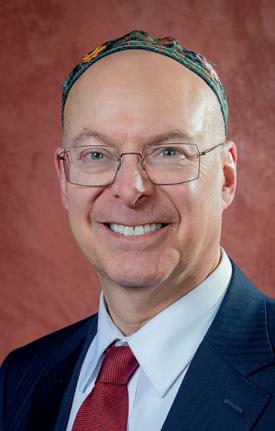
Rabbi Cantor
Gershon Silins on how becoming one will increase our standing in the UK and world
I RECENTLY returned from Chicago where I attended, for the first time, the annual Convention of the Central Conference of American Rabbis (CCAR), of which I am an overseas member. I found it to be inspiring.
I was struck by the fact that all these rabbis, young and old, newly ordained or retired, were part of one movement, working together. It’s not at all the case that everyone at the CCAR Convention agreed with one another – but there was an awareness, sometimes quite explicit, that we were all colleagues doing the same work in difficult times.
The differences were not submerged by the fact that virtually all these rabbis are members of one Progressive movement, the Union for Reform Judaism. The URJ is very well established in North America and speaks with Jewish authority in many areas of life, including the political arena.
We can’t, and wouldn’t wish to, replicate the American experience, but there is a lot we can learn from it.
I believe very strongly that the merger between Liberal and Reform Judaism offers us an opportunity to strengthen the standing of Progressive Judaism in the UK beyond anything that either of the current movements could do individually.
I treasure Liberal Judaism, which I have been part of since I arrived in the UK in 2011, and I understand the concern that its specialness might be diluted by the merger. And there is almost certainly a similar feeling in the Reform movement.
But I think the real danger for us at this moment is that failing to take what might be a once-in-a-lifetime opportunity would leave us perpetually weak and sidelined.
We can’t go back to the status quo ante, the state of things as they were before the merger was initiated. We can either go forward to a unified Progressive Jewish movement or, if we miss this opportunity, continue as two movements that attempted to renew and revitalise Progressive Judaism… and failed.
I believe the new movement will be stronger and more influential, in the UK and the world, than ever before.
I have heard some say that it’s better to wait. I don’t agree. There is an institutional momentum that has been building, and it can’t be put on hold without negative consequences and, quite possibly, terminal decline.
I don’t expect any of us to hold back on stating concerns. There will be a lot of arguing, discussing and, I believe, rejoicing in support of the merger, which I have faith that we can do well and which I believe will strengthen us as individual Jews, as rabbis and cantors, and as an increasingly powerful Progressive Jewish voice in the United Kingdom and beyond.
By Rabbi Lea Mühlstein (The Ark Synagogue), Rabbi Deborah Blausten (Finchley Reform Synagogue), Rabbi Jordan Helfman (Oaks Lane Reform Synagogue) and Rebecca Singerman-Knight (Co-Chair, Kingston Liberal Synagogue)

DO you care about Israel and want to be able to do something tangible to advocate for our values? Are you concerned with the current situation in the country and who is in charge? Have you felt powerless or hopeless?
As a Jew living in the UK, you are eligible to vote in the elections for the World Zionist Congress. This is the single biggest opportunity for UK Jews to influence the future of Israel and the Jewish people for the better.
The World Zionist Congress, often called the Parliament of the Jewish People, is an institution central to the Jewish people’s aspirations and identity. It was created by Theodor Herzl in 1897 – long before the establishment of the State of Israel – as a forum where all Jews could express their visions.
Today, it represents a platform for Diaspora Jews, including our Progressive Jewish communities, to engage in Israel’s actions and values. Through the World Zionist Congress, Progressive voices aim to influence Israeli policy and budget decisions – advocating for democracy, pluralism, human rights and a pathway to peace with Palestinians.
Right now, ultra-Orthodox and ultranationalist Jews are working hard to shape an Israel where our values, and our people, are not welcome.
It is therefore vital that Progressive Jews support slates in the 2025 World Zionist Congress election representing our principles. In the UK, the Liberal, Reform and Masorti movements are standing on a joint slate called Our Israel
The World Zionist Congress is an important, institutional way for Progressive voices to have a real and impactful say in how Israel spends its money and treats its people. A vote for the Our Israel slate is a vote for:
• Peace
• Pluralism
• LGBTQI+ rights
• Women’s rights
• Returning our hostages
• Strengthening Progressive communities
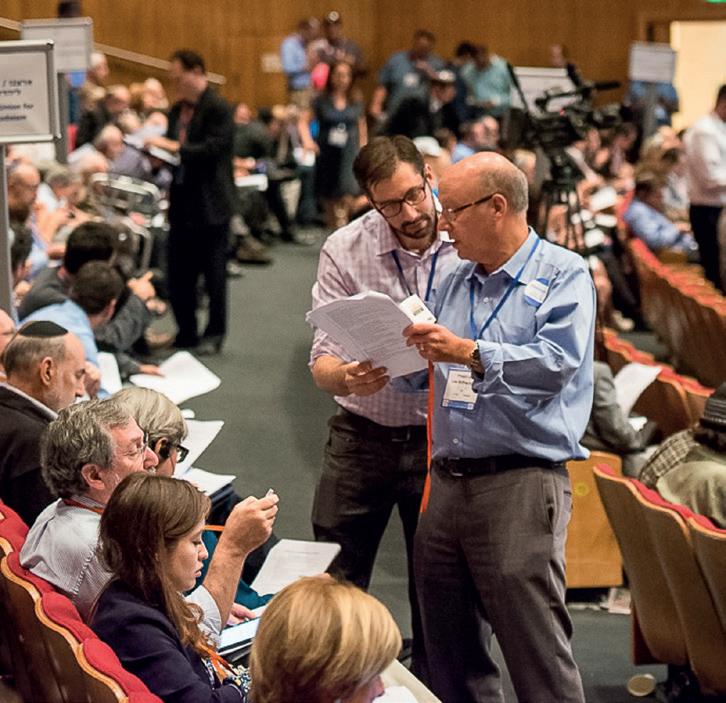
We are at a turning point in Jewish history. The voices and activism of Progressive Jews in the Diaspora has never been more crucial.
We are up against motivated and disciplined opponents whose vision for the future of Israel is diametrically opposed to ours.
Right-wing, religious fundamentalists are organising against us with plans to roll back all the issues we care about: chipping away at Israel’s democracy; rolling back gains for LGBTQI+ rights, gender equity and religious pluralism; stripping our Israeli Progressive clergy and communities of their rights, funding and infrastructure; ensuring our converts and children are not welcome in the Jewish state; and blocking any hope of Palestinian self-determination and safety.
They want to write the next chapter of Jewish history and write us out of it – our values of pursuing justice demand that we cannot allow this to happen.
Voting will take place between 8 - 12 June 2025. However, to be able to vote you need to register before 13 May at uk.eventmagix.com
In order to register to vote, you must be Jewish, over 18 (on 30 June 2025) and a permanent resident of the UK. You also need to accept the Jerusalem Program –the official platform of the World Zionist Organisation.
To ensure security, all those registering are asked to upload a photograph of their ID (passport or driver’s licence) and pay a token £1 registration fee.
Progressive Judaism is growing all around the world, but sadly our representation often lags behind. These World Zionist Congress elections are a rare chance to correct this imbalance.
Registering and casting your vote for Our Israel is a step towards pluralism, progress and ensuring that Zionism remains forward-thinking and inclusive.
ON 6 October 2023, Sagi Golan was a young man with everything to look forward to – especially his upcoming wedding in one week to the love of his life, another young man, Omer Ohana (pictured together on the right).
When Hamas attacked on 7 October, Sagi sprang into duty as an IDF reservist. He didn’t wait for a command, but just grabbed his gear and kissed Omer goodbye. He ran into fire to successfully rescue dozens of residents of Kibbutz Be’eri – one of the hardest hit communities of the terror attacks.
Tragically Sagi did not make it home for his wedding. He fell in the line of duty. Sagi was revered as a hero… until the moment his beloved fiancé tried to mourn him in traditional Jewish rituals.
At this time, IDF policy was under control of the ultra-Orthodox rabbinate. It granted rights and benefits to the widows and widowers of soldiers fallen in the line of duty – but excluded same-sex couples.
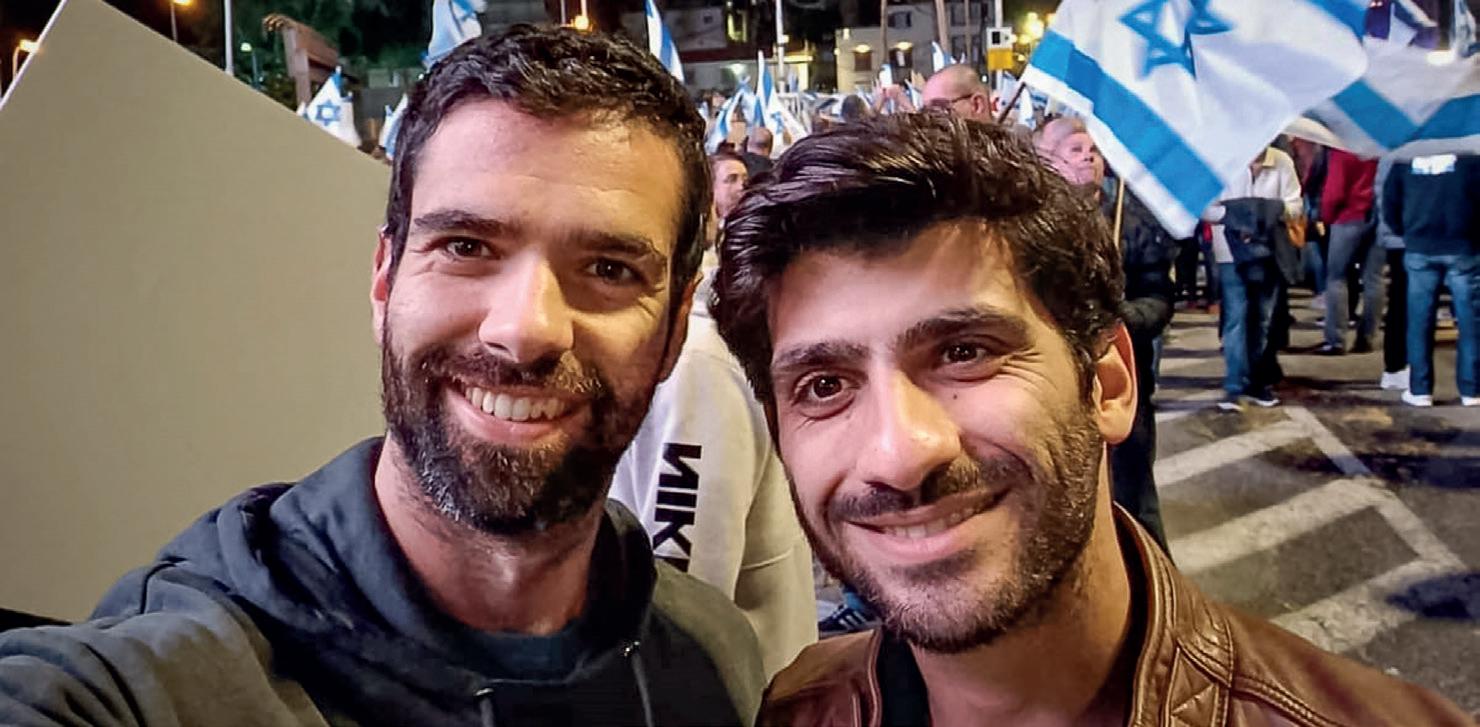
At Sagi’s shiva service, his bereaved partner was told he was not allowed to tear his garment; a palpable symbol of mourning observed by immediate family. With the sacrifices soldiers were making after 7 October, the public had finally had enough!

By Rabbi Lea Mühlstein
“DO you want to be a delegate to the World Zionist Congress?”
When I was asked this question in 2005, I had heard of Herzl’s famous Congress but wasn’t aware that it was something that had continued after the founding of the State of Israel.
I reflected on the fact that the work of the first visionaries of modern Zionism was still incomplete – and was reminded of Rabbi Tarfon’s famous teaching in Pirkei Avot: “It is not your duty to finish the work, but neither are you at liberty to neglect it.”
And so, I took a leap of faith and agreed to attend the 35th World Zionist Congress. I was immediately inspired by the sense that this was a direct way of how I could help to fight for the broader acceptance of Progressive Jews worldwide, advocate for our values and secure essential funding for both our movement in Israel and the World Union for Progressive Judaism.
In the years since my first Congress, I have personally seen many achievements secured to make us proud. These include: the establishment of an egalitarian prayer section at the Western Wall and other advances for religious pluralism; and funding to support the work of the Israeli Reform movement and its Religious Action Center (IRAC), which has secured historic wins for LGBTQI+ rights in Israel, challenged gender discrimination and fought racism.
Our representatives on the board of Keren Kayemeth Leyisrael (the Jewish National Fund) have blocked Jewish developments on Bedouin land, stopped land purchases across the Green Line and continue to monitor closely that the funds of the Zionist movement are not used to further settlements in the West Bank.
Thanks to the funding from the World Zionist Organisation, our movement is at the centre of advocating for the return of the hostages and is making a tremendous contribution to rebuilding the communities in the Gaza envelope.
Many Jews in the UK – like me 20 years ago – may not know that they have a vote to determine the British delegation to what will be the 39th World Zionist Congress. But you do.
So please listen to Rabbi Tarfon and make sure you take part.
After years of the Israel Movement for Reform and Progressive Judaism’s Religious Action Center leading the fight, LGBTQI+ advocates achieved a win that November when Omer and others brought their struggle to the Knesset.
The law was amended to grant widow or widower status to partners and spouses of any gender who lost their loved one in combat.
Omer said: “Time doesn’t really pass, but now there is a feeling of meaningfulness after what happened in the Knesset. There’s also a feeling of justice, which was one of the strongest things that led Sagi when he was alive.”
It was previous votes in World Zionist Congress elections – and the influence and funding received due to them – that allowed us to fight for Omer’s rights. But there is still a long way to go.
On that same terrible day, 7 October 2023, the Kapshiter family were on a road trip from Ashkelon to their home in Be’er Sheva. On the way, they were ambushed by Hamas terrorists and murdered together – father Yania, mother Dina and their young children, Aline and Eitan.
When it came time for their grieving families to begin the mourning process, the ultra-Orthodox monopolised rabbinate ruled that since Yania was not born to a Jewish mother, he was not permitted to be buried in his hometown cemetery alongside his wife and children.
Instead of separating him from his beloved family, beside whom he had lived and died, his parents’ trauma was compounded by making the difficult decision to bury the whole family outside the cemetery fence, in an area that is traditionally viewed with less sanctity. Your vote will help support the work to change the rules around burial and status and reflect a pluralistic and inclusive Israel that grants dignity to all. Please register and take action today.
THE new season of the Progressive Judaism Education Hub has just begun and is exploring the Principles of Progressive Judaism.
Over the next three months, some of the UK’s most senior rabbis and educators will be looking at our Progressive beliefs, values and ideologies – examining how they originated, their development through history and where we stand today.
Whether you are new to Jewish studies, seeking to deepen your understanding or just interested in finding out more about the 250 year history of Progressive Judaism, this series will illuminate the shared ideals and transformative journeys that have shaped our Judaism.
Sessions take place on Wednesday nights at 7pm via Zoom (except the third, which is on a Monday). They are free and open to all – and you can take part in as few or as many as you wish.
Season 1 of the Education Hub covered the lives and legacies of 10 of the Pioneers of Progressive Judaism and can be watched back on www.youtube.com/ @ProgressiveJudaismUK
The full list of dates, topics and educators for Season 2 are below:
• REGISTER FOR THE EDUCATION HUB: www.tinyurl.com/EducationHub2025s2 (Please note: As this is a new season and topic, previous participants will still need to register)
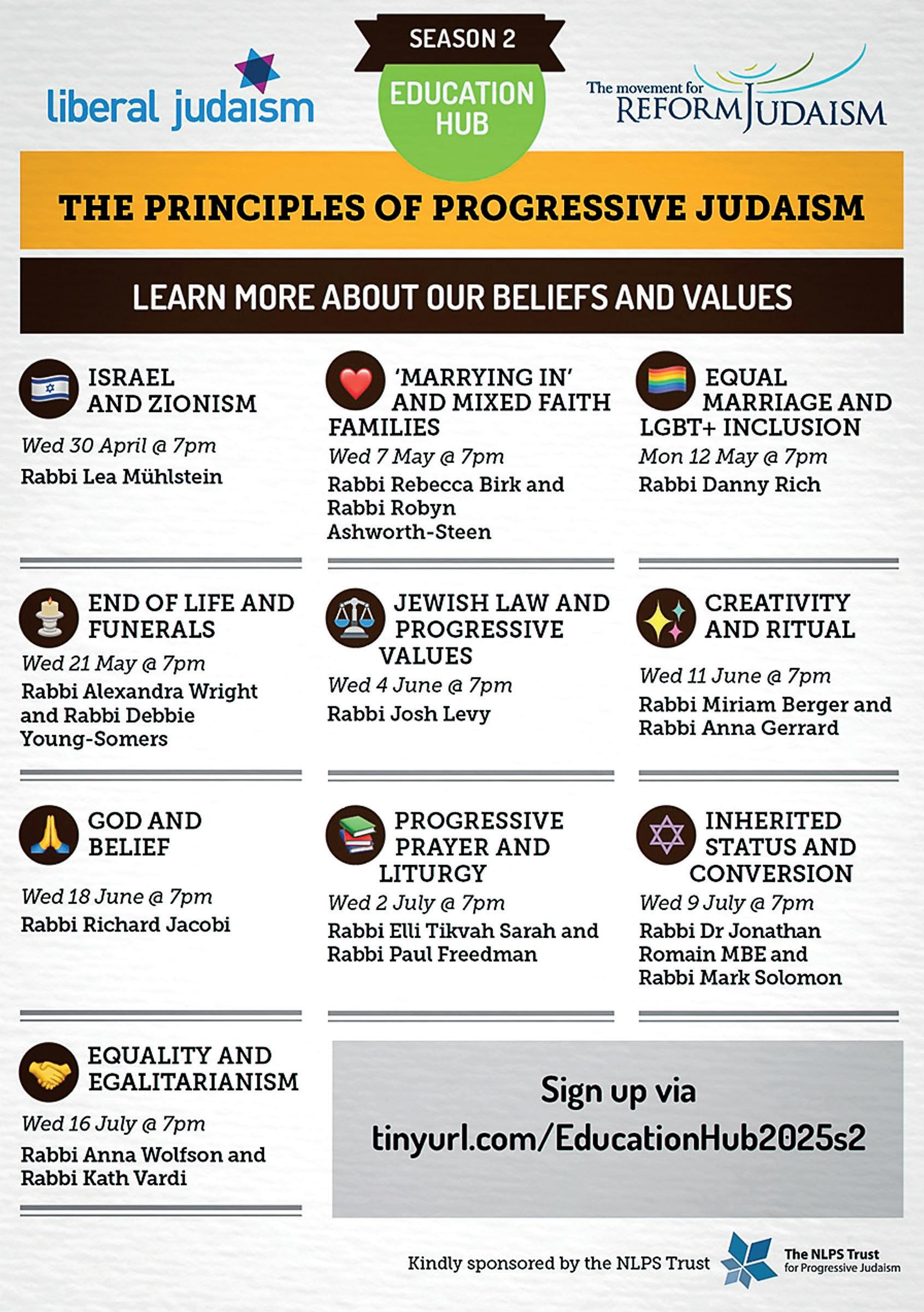

THE Kivunim National B’nei Mitzvah programme for 2025-27 is now open to all young people from small and mediumsized Liberal and Reform communities. This friendly and supportive programme brings young Progressive Jews from school years 7 and 8 together to build strong year group cohorts and add fun, friendship and lifelong memories to their Bar/Bat/B’nei Mitzvah preparations.
There will be challenges and activities to complete, and all those who complete the programme will celebrate with a never to be forgotten theme park trip.
The two-year programme has six main areas of focus explored over residential weekends in November and April:
Jewish Identity (year 7)
Tikkun Olam (year 7)
Community (ongoing)
Jewish Ritual (ongoing)
Informed decision making (Year 8)
My life as a Jewish adult (Year 8)
The weekends also include climbing, kayaking and archery, as well as Shabbat celebrations. Above all, it’s about making new friends to share the experience with. This opportunity is open to all members of participating communities. For details, please visit www.reformjudaism.org.uk
A NEW initiative, DeafShul, has launched with the mission to ensure that D/Deaf Jews can fully participate in every aspect of Jewish life. It aims to break down barriers and provide equal access to religious, educational and community experiences.
Friday Night services are held monthly. The first two took place at Maidenhead Synagogue (led by Rabbi René Pfertzel) and Finchley Progressive Synagogue (led by Rabbi Rebecca Birk).
For more information, contact DeafShul at deaf.shul@gmail.com

THE incredible impact made by our Liberal and Reform communities and members on Mitzvah Day, and all year round, was celebrated at the annual Mitzvah Day Awards.
Southgate Progressive Synagogue were presented with the Outstanding British Mitzvah Day prize, after holding a month of activities with 140 charitable good deeds taking place.
The synagogue’s Mitzvah Day coordinator Sarah Bendredj said: “Mitzvah Day galvanised our whole community to come together and get involved in social action, from those aged three to 93! To win this award, and have our projects celebrated in this way, makes me very proud.”

Mitzvah Mensch Debbie Drapkin (centre) with MD Trustees Laura Marks and Judy Mizrahi
Debbie Drapkin, a member of The Ark Synagogue, and Membership Engagement Lead for Edgware and Hendon Reform Synagogue (EHRS), was presented with a Mitzvah Mensch Award.
Debbie – who has also worked for Mitzvah Day – was praised for developing worthwhile projects, building new interfaith relationships and bringing the whole EHRS community on board. The ceremony took place on the same day as her retirement.
Debbie said: “Receiving this award really means everything to me –particularly as today is the day I leave the working world and start my life in the volunteering world.”
The Mitzvah Day Awards ceremony took place at South Hampstead United Synagogue and was hosted by the charity’s Chair Laura Marks CBE. Rather than paying for tickets, attendees were asked to bring non-perishable food items to be donated to New Horizon Youth Centre, which supports young Londoners experiencing homelessness.
Winners and nominees came from many different religions, backgrounds, ages and regions – all united by their social action work to help some of society’s most vulnerable people.
Worcestershire Interfaith Forum –which includes members of Birmingham Progressive Synagogue – shared the Outstanding Interfaith Partnership prize with Hendon School.
The Forum was recognised for the 10 years that its team of 40+ Jewish, Christian, Muslim, Sikh, Jain and Baha’i volunteers working together to support patients and staff at the local hospital.
The Lincoln Hygiene Bank – an interfaith initiative run by the Centre for Reconciliation and with which Lincolnshire Jewish Community are deeply involved – won the Year-Round Award.
The Centre was rewarded for its work collecting and distributing personal hygiene and household cleaning products each week to those struggling financially. The initiative launched last year.
Rachael Phillips, Chair of Lincolnshire Jewish Community, said: “We are proud to work with Lincoln Hygiene Bank and The Centre for Reconciliation. By working together across faiths, we can create a better community and help others.”
All those nominated for awards were also celebrated on the evening, including North West Surrey Synagogue, Radlett Reform Synagogue, Beth Shalom Reform Synagogue Cheder, Bromley Reform Synagogue OZ Group, The Liberal Jewish Synagogue Religion School and Brighton & Hove Interfaith Contact Group.
• Pictures by Yakir Zur.
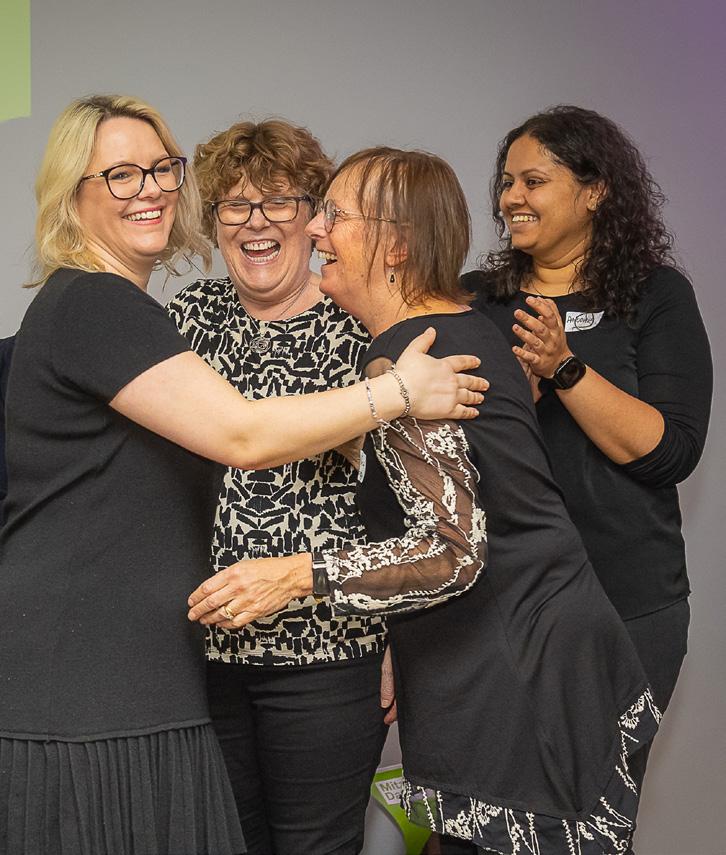
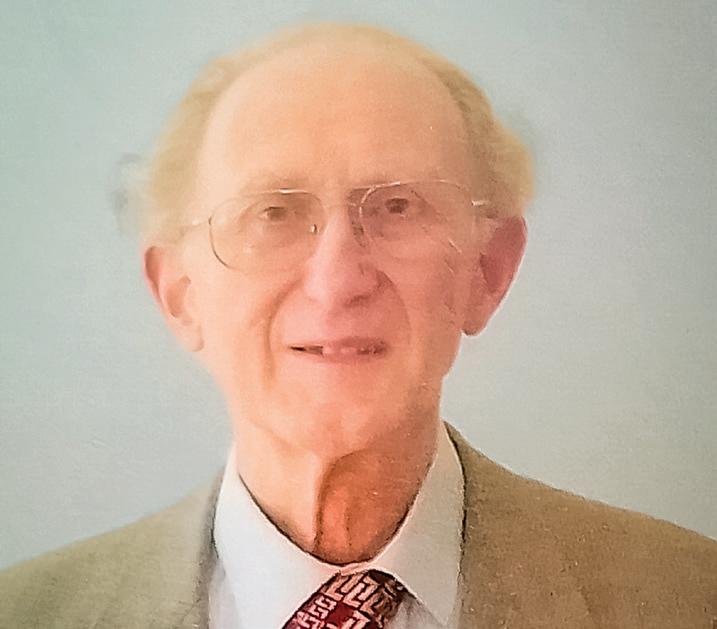
BRYAN DIAMOND – a tireless advocate in collating and keeping alive the history of Liberal Judaism – has died, aged 88.
Bryan served as Liberal Judaism’s Archivist for several years and was also the Archivist of The Liberal Jewish Synagogue (LJS), where he was an active member along with wife Judith.
Rabbi Alexandra Wright, Senior Rabbi of the LJS, paid tribute, saying: “Bryan was drawn to the ethical teachings of Liberal Judaism; it was the bedrock of his personality, his anchor, his identity and sense of belonging.
“His involvement in the movement, whether as a younger delegate or throughout his professional life as a patent lawyer, was so important to him.”
Bryan’s book on Claude Montefiore was a seminal work – meticulously researched to give a comprehensive look at the multi-faceted details of the life of one of the founders of Liberal Judaism.
Rabbi Alexandra said: “Bryan was already in his 80s, but his determination, his absolute persistence and his fascination and interest in Montefiore, ensured that the book came to fruition.
“Bryan wasn’t someone who would give up easily. If he wanted to do something, he would do it. He was persistent. And his book, this legacy of 300 pages, testifies to that determination, to his admiration of Montefiore and to Bryan’s lifelong commitment as a Liberal Jew, to its principles, to the debates and discussions that are part of community life.
“Until the very end of his life, less than two weeks before he died, he came to the synagogue with Judith to attend a talk on Rembrandt. I am not sure of the arrangements and effort it took to bring him on that occasion, but Bryan’s clear vision and determination would have ensured that this final visit took place.”
Bryan is survived by his wife Judith, daughters Lyn, Naomi and Susannah, and grandsons Reuben and Solly.

THE Sixth Annual Rabbi Harry Martin Jacobi Memorial Lecture was marked by deep appreciation for Jewish resilience, as Rabbi Dr Andrew Goldstein delivered an engaging talk exploring the themes of hope, perseverance and faith.
Rabbi Andrew compared the pessimism of the prophet Jeremiah with the optimism of Rabbi Harry Jacobi by drawing parallels between historical struggles and modern-day challenges.
The lecture highlighted Rabbi Harry’s unwavering commitment to justice, progress and interfaith understanding, thus ensuring his legacy continues to influence current and future generations.
ONE of my earliest memories growing up is of Baron and Kit Harris. I would see them every week at Southgate Progressive Synagogue, where my father Harry was the rabbi, and it was one of the joys of attending services.
During this time, my father performed the wedding of Baron and Kit’s granddaughter Sharon to Andrew Goldstein – then a student rabbi.
Two of Baron and Kit’s children, Davine and Beryl, were members of the synagogue. The third, Elise, was in Birmingham with her husband Harold, but my parents knew them well through the movement’s conferences.
When I left home to go to Birmingham University, my parents put me in touch with Elise and Harold and they immediately offered me hospitality for Rosh Hashanah and Yom Kippur. They continued to offer me a home from home for all the festivals. This meant a lot to me as I missed my family on these occasions. I remember how caring and warm they were.
Among those in attendance at Southgate Progressive Synagogue were Rabbi Harry’s children – Rabbi Dr Margaret Jacobi and Rabbi Richard Jacobi – and his grandson Yoni.
Others at the event included Progressive Judaism Co-Lead Rabbi Josh Levy, Liberal Judaism Chair Karen Newman, Rabbi Danny Newman of SPS, Deputy Mayor of Enfield Cllr Margaret Greer, Cllr Nagus Narenthira and Bambos Charalambous MP.
Rabbi Andrew’s lecture served as both a tribute and a call to action for the Jewish community to acknowledge Rabbi Harry Jacobi’s significant legacy.
Meanwhile, my brother David became a leader at the Kadimah Summer School, which was founded and run by Andrew and Sharon. Their children, Aaron and Ruth, grew up at Kadimah so David got to know them well too.
Aaron – like both me and my other brother Richard – became a rabbi so that we had in common the privilege of working alongside our fathers. Then our children, too, began attending Kadimah, now part of LJY-Netzer.
Tali, our daughter, made friends with Aaron’s and Ruth’s daughters. She shared the joy of Kadimah with them, both as a participant and as a leader.
This year, Aaron’s daughter Shaya came to Birmingham as a student. I was very glad to be able to repay the hospitality that Elise and Harold had offered me, nearly 50 years ago, by welcoming Shaya to our home for her first Rosh Hashanah away from home.
And so, we have had friendships between the Jacobi and Goldstein families for five generations, from Kit and Baron, born in the 19th century, to Shaya and Tali, born in the 21st. Long may those strong bonds continue!
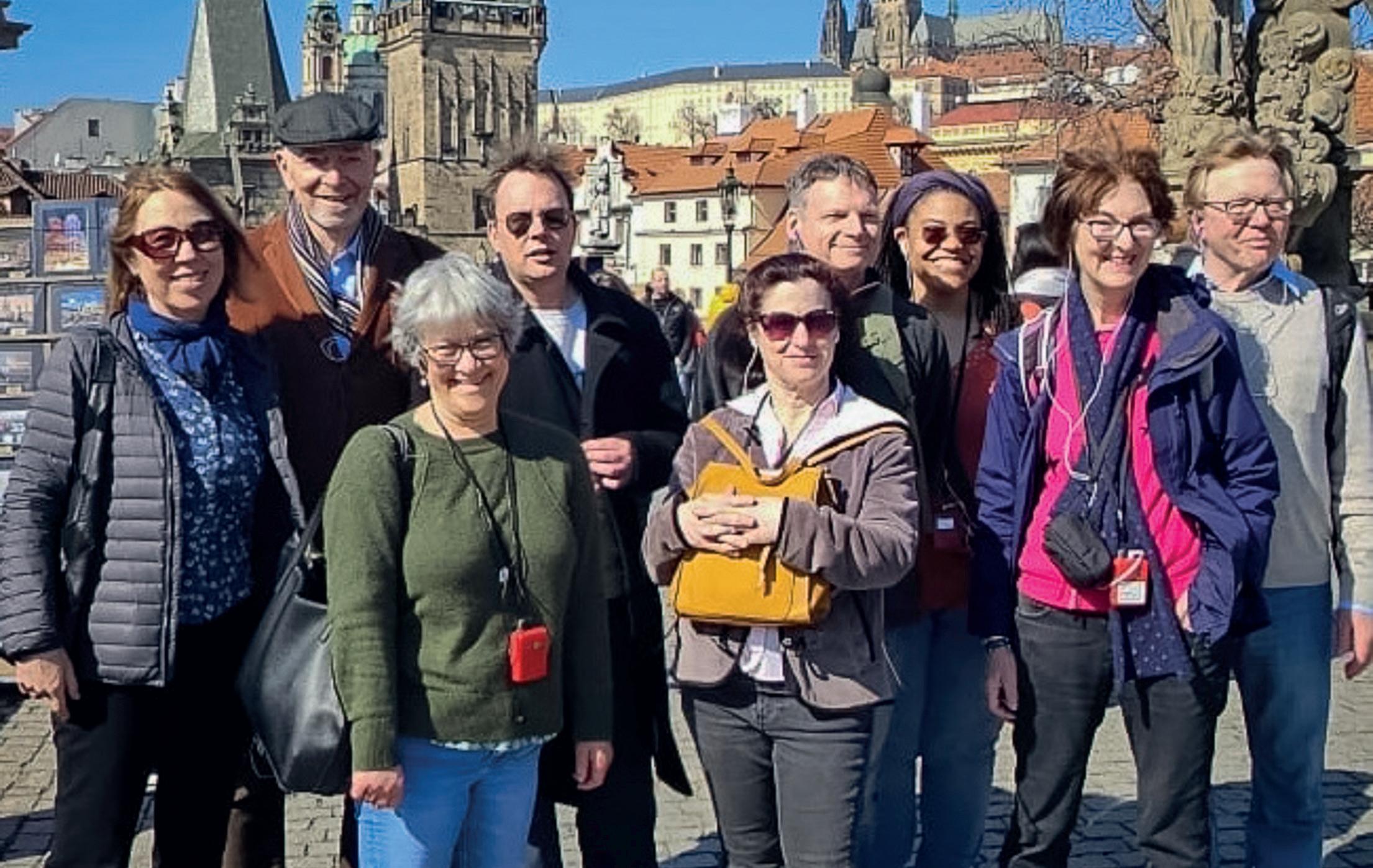
A GROUP of Kingston Liberal Synagogue (KLS) members undertook a remarkable journey through Central and Eastern Europe, visiting some of the most significant sites of Jewish medieval, modern and contemporary history.
Led by KLS Council member, historian and professional tour organiser Dr Alexander Heinz – together with Craig and Mary Simmons, Sara Alston, Robyn Harris, Hilary Cohen, Tom Rosenbaum and Clive Suckling – the group traced the rich and complex legacy of Jewish communities across the region.
Their itinerary took them through Erfurt, Prague, Kraków, Warsaw, Lublin and Vilnius, where they uncovered the diverse layers of Jewish life, resilience and remembrance. They connected with fellow KLS members, including Barbara and Mark Richards in Prague, Rabbi Lev Taylor and Laurence Suckling in Kraków, and Monika Heryng in Warsaw, alongside local guides and rabbis.
THE spirit of collaboration and friendship was in full bloom as members of the Reading Liberal Jewish Community (RLJC) joined with Reading Quakers for a planting event at the Friends’ Meeting House Garden. This tranquil and historic space is the setting for RLJC’s monthly services, which has fostered a deep connection between the two communities.
Building on the success of last year’s bulb planting, an initiative now destined to become an annual tradition, the group came together to prepare seeds and bring fresh life to the garden.
A particularly moving moment was their attendance at an Erev Shabbat service at Ec Chayim Reform Synagogue in Prague, where Craig and Mary lit the Shabbat candles, symbolising unity and continuity of Jewish traditions across borders. The group also visited Rychnov nad Knežnou, the town from which one of the KLS’s Czech Torah Scrolls originated, reaffirming the synagogue’s connection to Jewish heritage.
Dr Alexander said: “This was an immensely special and joyful experience for us all. From discovering unknown treasures of medieval German-Jewish history in Erfurt, to singing the Hatikvah by the River Vlatava together, to getting to know today’s Liberal communities in Prague and Warsaw, to visiting the village of one of our Czech scrolls and discovering the centres of Yiddish scholarship in Lublin and Vilnius: it’s been a privilege organising this trip for Kingston Liberal Synagogue.”
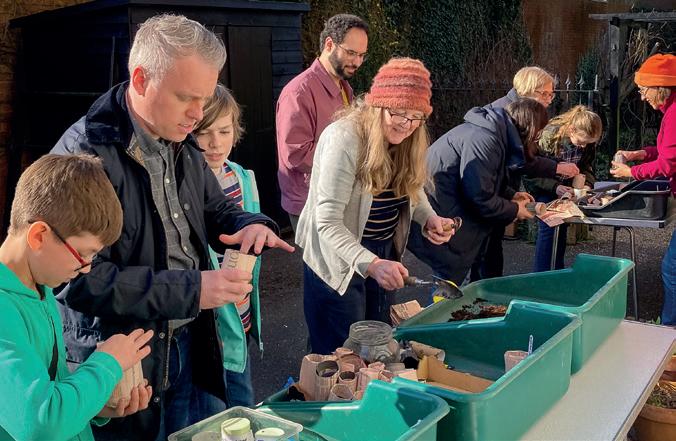
At this spring event, members of all ages enthusiastically scattered wildflower seeds to ensure a tapestry of colours will be on display in the coming months.
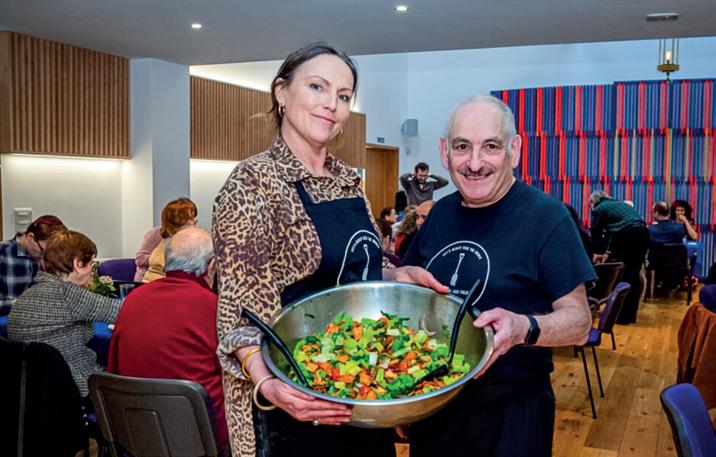
BRIGHTON & Hove Progressive Synagogue (BHPS) kicked off a series of special events for the community’s 90th anniversary with an eco-lunch to mark the shul’s EcoJudaism achievements.
The day featured live klezmer music, a quiz, guest speakers and a plant-based feast catered by The Real Junk Food Project Brighton (pictured above), a local charity who intercept food waste destined for landfill and use it to feed people who need it on a ‘pay as you feel’ basis.
The event was hosted by BHPS member, public speaker, writer and sustainability expert Benita Matofska. Benita explained how she started a Green Team at the synagogue in 2018, and the incredible work they have done since to become one of only three synagogues to win an EcoJudaism Gold Award.
She said: “We switched to eco-friendly products, eliminated single-use plastics, employed eco cleaners, bought recycled stationery, reduced energy consumption, tackled waste and introduced Who Gives a Crap toilet paper, supporting the building of toilets in the global South. We ran clothes swaps, EcoShabbat services and plant-based chavurah suppers.”
Benita added: “We’re here to celebrate and be proud of BHPS, reaching 90 and also making a difference in the world.”
Speakers included Progressive Judaism Co-Lead Rabbi Charley Baginsky, the synagogue’s Rabbi Gabriel Kanter-Webber and EcoJudaism’s Founder Rabbi Jonathan Wittenberg OBE and CEO Naomi Verber.
Naomi said: “BHPS has blazed a trail, showing how communities can transform into beacons of Jewish environmental responsibility. We’re so proud BHPS chose to celebrate their amazing work with EcoJudaism as part of their 90th birthday celebration.”
In his address, Rabbi Gabriel discussed the many milestones and landmark moments BHPS has achieved since its founding in 1935. Speaking about the event itself, he added: “At this moment of celebration, we chose not to have a blacktie do, but an ecologically-sound lunch.”
By Karen Pollak
MOSAIC Jewish Community’s Israel Society put on a captivating evening featuring Oshra Schwartz, a leading light of the Israel Movement for Reform and Progressive Judaism, who showed her acclaimed film, The Komediant, about the heritage of Yiddish theatre in America.
The film was in the form of a documentary about famous Yiddish actors Pesach Burstein, his wife Lottie Lux and their two children, Susan and Michael. They became known as the Four Bursteins.
The film explains how the authentic Yiddish theatre was born out of poverty and the community’s desire for education and entertainment. It performed anything from high drama and operettas to lowly comedies.
Yiddish theatre became so popular that, at one point, there were five different ones on Second Avenue in New York alone.
The Bursteins also performed in the Catskills, which at the time was as big a deal as playing Las Vegas. Auditions were brutal as the shows were so popular and there was great demand for the actors to get work and have membership of the Union. The Union of Hebrew Actors was one of the first unions of its kind.
Oshra, who had previously taught theatre in Israel, talked to us about trying to get the film off the ground. That wasn’t an easy task but, having watched it, I can assure you that it was well worth it. It gave us an amazing insight into the dynamics of a working theatrical family.
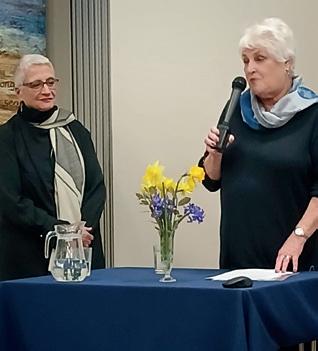
Oshra (pictured with Mosaic’s Joan Noble) then went on to speak about the development of the Reform movement in Israel for which she is working, and of how it is growing and now numbers some 55 communities.
She also spoke of Kibbutz Re’im, whose people are in need of help after the Hamas terrorist attacks of 7 October 2023. It is being supported by Mosaic Jewish Community.
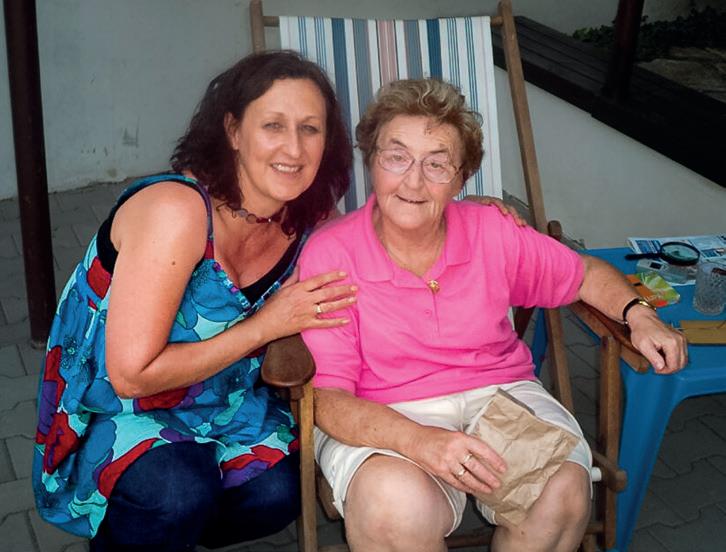
TO commemorate the 80th anniversary of the liberation of Auschwitz-Birkenau, Holocaust educator and author Debbie Moss has released Angel’s Teeth, a new book designed to be a sensitive and gentle way to introduce children to the most difficult of subjects.
The book is a captivating retelling of the true story of Ruth Matejovska (pictured with Debbie in 2009), who survived the Terezin concentration camp as a child.
Ruth and her parents were the sole surviving Jews from their hometown of Slavkov/Austerlitz, to which they returned after the war.
Nottingham Liberal Synagogue, where Debbie is a member, received a Torah scroll from Slavkov through the Czech Scrolls Memorial Trust and she is also part of the group that has established links with the town.
The book is available from all major retailers and Debbie is also open to working with teachers to further support education on this topic.
Angel’s Teeth not only introduces young readers to the Holocaust in a thoughtful and accessible way, but also includes teacher aids for classroom use.
A launch event, held at the National Holocaust Centre, was a huge success with all proceeds from sales generously donated back to the Centre.
Endorsements have poured in, including praise from public figures such as Lord (Daniel) Finkelstein, who called the story “a gem that shines through the ashes and the tears,” and Dame Maureen Lipman, who commended its “beautiful writing and age-appropriate approach.”
Debbie Moss’s tireless dedication to Holocaust education is ongoing, with frequent visits to Auschwitz as a group leader for the Holocaust Educational Trust (HET). Her passion is matched by her achievements, as Angel’s Teeth resonates not just with children but with anyone who believes in the importance of remembering history through compassionate storytelling.
This powerful book ensures that the legacy of survivors like Ruth Matejovska – who died a few years ago after a long and fruitful life – continues to inspire and educate future generations.
YORK Liberal Jewish Community (YLJC) joined up with their neighbours for a ‘Clothes Swap Happening’, an event designed to reduce waste, support York City of Sanctuary and assist young people experiencing homelessness.
The Friends Meeting House in Friargate was full of excitement and community spirit as members sorted through their wardrobes, ready to give new life to cast offs while raising funds for a good cause.
Led by the hard work of Rabbi Elisheva Salamo and Sarah Hubbard, of the YLJC Steering Committee, the initiative was more than a clothes swap. It was a celebration of sustainability, inclusion, and interfaith co-operation. Members of YLJC’s Social Justice Team played a key role in organising the event, encouraging people of all ages to donate the clothes they no longer wear.
Sarah was delighted with the success of the day, saying: “This is about more than fashion. It’s about community, sharing and making sure homeless people in our city feel seen and supported.”
Rabbi Elisheva added: “Seeing people come together for such a meaningful cause is truly inspiring.”
There was a remarkable array of donated clothes, from casual wear to some glamorous outfits, with the understanding that each swap contributed to a larger purpose. Any items that were unclaimed were donated to the Carecent Homeless Charity.
Owen Power YLJC’s LJ Board’s link officer and Board of Deputies representative (pictured below right) said: “Plans for another swap in the summer are now underway – it is great to see the community develop and flourish.”



LJY-Netzer is Liberal Judaism’s Zionist youth movement. It gives young people the opportunity to develop a strong Progressive Jewish identity, make lasting friendships and have loads of fun
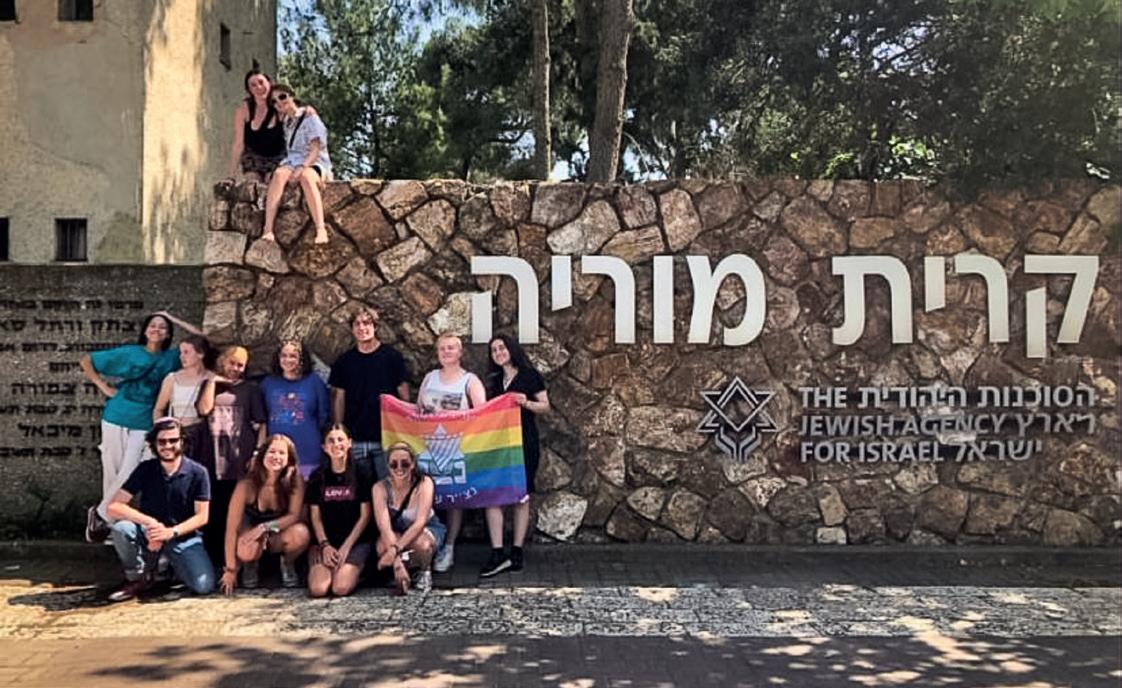
LJY-Netzer and the Reform youth movement RSY-Netzer are pleased to launch Shnat Netzer 2025-26, a joint sixmonth gap year programme.
Participants will come together in South Africa and Israel, joining with different branches of Netzer Olami (the worldwide Progressive Jewish Youth Movement), to explore their Jewish identity as part of an ideological, modern, inclusive and dynamic community.
We have created an exciting and enriching programme full of chinuch (education), volunteer work and kef (fun) – all while bonding as a group with peers from around the globe.
You can find out more and register interest at www.ljy-netzer.org/shnat-5786
The programme has three components.
The first month will be spent in South Africa, with the Netzer branch there, experiencing the culture, leading on Netzer summer events, learning about the history, and exploring new places.
Participants will get the chance to feel part of a wider, international Progressive Jewish community, making connections with another Netzer branch, including meeting South Africans who are likely to join the Israel component.
The next month is at Kibbutz Lotan, a Reform Kibbutz in the south of Israel, in which participants will volunteer at the Lotan Ecological Centre, working on the centre’s environmental projects and having sessions to deepen their understanding of Judaism, Kibbutz life and sustainability. They will also have the opportunity to look after the Kibbutz children, a really special way to integrate into the community and develop their leadership skills.
WE had an incredible time on Machaneh Shamayim. It was a jam-packed five days filled with fun, learning, community and lots of sunshine!
We were so happy to have had lots of new participants who joined LJY with this event, and they all settled in to our community, making lots of friends.
We had an array of activities, whole camp gettogethers, singing sessions and interesting discussions.
Camp ended with our traditional Last Night Show and disco, where participants and leaders alike showcased their many talents and danced the night away.
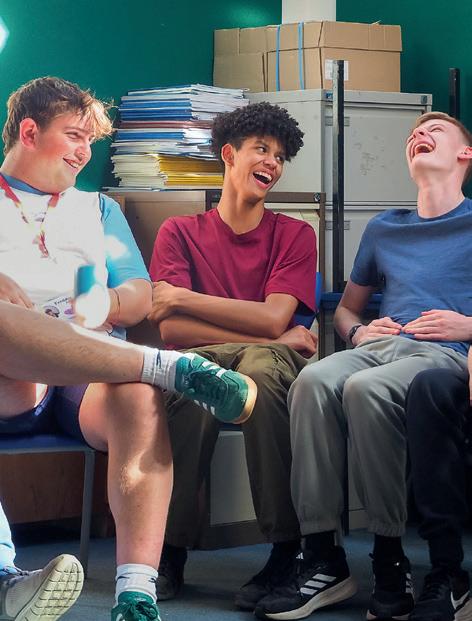
The remaining three months of the programme will be in Haifa, living independently in communal apartments, experiencing day-to-day life in Haifa while engaging in meaningful volunteering with the range of communities in the area, including Palestinian Citizens of Israel, Druze, Olim (immigrants) and Israelis. Volunteer opportunities include working in education, community support, or grassroots social justice initiatives.
There will also be sessions from Netzer and organisations such as Seeds of Peace and the Israel Religious Action Center (IRAC), offering diverse perspectives on activism and leadership. These sessions will explore the Jewish roots of social justice, connecting hands-on volunteering to broader values of tikkun olam (repairing the world).
We are keen to stress that we do not want finances to be a barrier to anyone joining our Shnat Programme. There is lots of support available to help with this, including funding from the UJIA. This really is open to everyone.
Shnat Netzer is a hugely exciting opportunity for LJY and RSY members to meet each other, get closer and learn about the similarities and differences between our two youth movements. It has been a collaboration for a number of years, and is an incredible opportunity for us to work closely together.


Contact LJY-Netzer: Email Tali Ehrlich (t.ehrlich@liberaljudaism.org), Mia Harris (m.harris@liberaljudaism.org) and Jess Spanier (j.spanier@liberaljudaism.org) or visit our website www.ljy-netzer.org
The Ark Synagogue (Northwood and Pinner)
T: 01923 822 592
E: admin@arksynagogue.org W: arksynagogue.org
Bedfordshire Progressive Synagogue T: 0845 869 7105
E: info@bedsps.org.uk W: bedfordshire-ps.org.uk
Beit Klal Yisrael (London) E: admin@bky.org.uk W: bky.org.uk
Birmingham Progressive Synagogue T: 0121 634 3888 E: bps@liberaljudaism.org W: bpsjudaism.com
Brighton and Hove Progressive Synagogue T: 01273 737 223
E: info@bhps-online.org W: bhps-online.org
Bristol and West Progressive Jewish Congregation T: 0117 403 3456
E: info@bwpjc.org W: bwpjc.org
Crawley Jewish Community T: 01293 534 294
Crouch End Chavurah E: naomi@crouchendchavurah.org W: www.crouchendchavurah.org
Dublin Jewish Progressive Congregation
E: djpc@liberaljudaism.org W: djpcireland.com
Ealing Liberal Synagogue T: 020 8997 0528
E: admin@ealingliberalsynagogue.org.uk W: ealingliberalsynagogue.org.uk

East London & Essex Liberal Synagogue T: 0208 989 7619
E: administrator@elels.org.uk W: elels.org.uk
Eastbourne Liberal Jewish Community T: 07376 916 920
E: eljc.contact@gmail.com W: eljc.org.uk
Edinburgh Liberal Jewish Community T: 0131 777 8024
E: info@eljc.org W: eljc.org
Finchley Progressive Synagogue T: 020 8446 4063
E: fps@liberaljudaism.org W: fps.org
Kehillah North London T: 07706 354 602
E: info@kehillah.org.uk W: kehillah.org.uk
Kent Liberal Jewish Community T: 07384 993 553
E: enquiries@kljc.org.uk W: kljc.org.uk
Kingston Liberal Synagogue T: 020 8398 7400
E: kls@liberaljudaism.org W: klsonline.org
Leicester Progressive Jewish Congregation
E: chair@lpjc.org.uk W: lpjc.org.uk
The Liberal Jewish Synagogue (St John’s Wood) T: 020 7286 5181 E: ljs@ljs.org W: ljs.org
The Montagu Centre 21 Maple Street London, W1T 4BE T: 020 7580 1663
E: montagu@liberaljudaism.org W: liberaljudaism.org W: pathtoprogressivejudaism.org.uk
Liberal Judaism is the dynamic, cutting edge of modern Judaism. It reverences Jewish tradition, seeking to preserve the values of the past, while giving them contemporary force.
Charity Number: 1151090
lj today is edited by Simon Rothstein. Send news to SimonR@progressivejudaism.org.uk
The Liberal Synagogue Elstree T: 020 8953 8889
E: office@tlse.org.uk W: tlse.org.uk
Lincolnshire Jewish Community W: lincolnsynagogue.com
Mosaic Liberal Synagogue (Stanmore) T: 020 8864 0133 E: office@mosaicliberal.org.uk W: mosaicliberal.org.uk
Norwich Liberal Jewish Community E: nljc@liberaljudaism.org W: norwichljc.org.uk
Nottingham Liberal Synagogue T: 0115 962 4761
E: info@nottinghamliberalsynagogue.com W: nottinghamliberalsynagogue.com
Peterborough Liberal Jewish Community T: 07561 331 390 E: info@pljc.org.uk W: pljc.org.uk
Reading Liberal Jewish Community E: readingliberaljewishcommunity@ gmail.com W: readingljc.org.uk
Shir Hatzafon (Copenhagen) E: shir@shirhatzafon.dk W: shirhatzafon.dk
South Bucks Jewish Community T: 07377 157 261 E: info@sbjc.org.uk W: sbjc.org.uk
Southgate Progressive Synagogue T: 020 8886 0977 E: office@sps.uk.com W: sps.uk.com
The South London Liberal Synagogue (Streatham) T: 020 8769 4787
E: office@southlondon.org W: southlondon.org
Stevenage Liberal Synagogue T: 01438 300 222
E: stevenageliberalsynagogue@gmail.com W: stevenageliberalsynagogue.org.uk
Suffolk Liberal Jewish Community (Ipswich) T:01473 250 797
E: sljc@liberaljudaism.org
W: suffolkljc.co.uk
Three Counties Liberal Jewish Community (Gloucestershire, Herefordshire and Worcestershire)
T: 07900 612 058
E: info@3cljc.org.uk
W: 3cljc.org.uk
Wessex Liberal Jewish Community (Bournemouth) T: 01202 757 590
E: secretary.wljc@gmail.com
W: wessexliberaljudaism.org.uk
York Liberal Jewish Community T: 0300 102 0062
E: info@jewsinyork.org.uk
W: jewsinyork.org.uk
Oxford Jewish Congregation T: 01865 515 584
E: connections@ojc-online.org W: ojc-online.org
Chair Karen Newman
Deputy Chair Alex Kinchin-Smith Treasurer Leslie Moss Inclusion Alexandra Boyd
Youth Hannah Grant Communities and Social Justice Owen Power
Officers Penny Beral, Amanda McFeeters and Tommer Spence
President Rabbi Alexandra Wright
Vice Presidents Monique Blake, Nigel Cole, Lord (Stanley) Fink, Louise Freedman, Rabbi Dr Andrew Goldstein, Sharon Goldstein, Jane Greenfield, Lucian Hudson, Dr Edward Kessler MBE, Josie Kinchin, David Lipman, Frank Maxwell, Baroness (Gillian) Merron, David Pick, Rabbi Danny Rich, Tony Sacker, Joan Shopper and Phil Stone
Conference of Liberal Rabbis and Cantors Chairs Rabbi Anna Wolfson and Rabbi Igor Zinkov
Chief Executive Officer / Progressive Judaism Co-Lead Rabbi Charley Baginsky
Director of Development and Membership Alexandra Gellnick Youth Director Becca Fetterman
Head of Comms Simon Rothstein Lifecycle Administrator Lisa Godsal Finance Janet Manderson
Administration Manager Tanya Garfield Archivist Alison Turner Student Chaplain Rabbi Leah Jordan
LJY-Netzer Events Coordinator Jess Mindel
LJY-Netzer Movement Workers Tali Ehrlich, Mia Harris and Jess Spanier